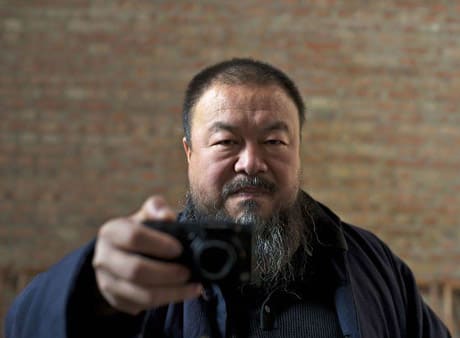For those who aren't fully immersed in the world arts scene, Ai Weiwei is the brilliant designer of the Beijing Olympic Stadium, also known as the Olympic "Birds Nest." His design was revered and adored the world over, acting as the centerpiece of the 2008 Olympic merriments.
Ai Weiwei is also the man that spoke out against China's oppressive policies that forced thousands of migrant workers out of Beijing, separating himself from the event he believed legitimised the Chinese communist regime, thus placing a tremendous bull's-eye on his back and destroying any chance he had of a prosperous career in his native country.
Alison Klayman's Ai Weiwei: Never Sorry provides revealing insight into the life of the artist turned activist, chronicling his career in the aftermath of his opposition to the Olympics. Of note is Weiwei's mission to find the truth amidst the 2008 Sichuan earthquake, which took the lives of many school children, only to be covered up by the government. He enlisted a group of people to compile a list of names of the dead, ultimately embarrassing the government while thrusting himself further into the spotlight.
After his online blog gets shut down by the authorities, he turns to Twitter and proves it isn't just for dilettantes and people snapping pictures of their food, but an art form unto itself. Heavily censored by his government, Twitter becomes Weiwei's 24/7 medium, one where he can display his thoughts and actions, often with an accompanying photo, even documenting a police beating he suffered that later required brain surgery.
While the film briefly touches upon his upbringing and his initial foray into the world of art, it hones in on the events of the last few years, focusing more so on the activist than the artist. As Weiwei's voice grows louder and his dissent of his country's regime mounts, his followers continue to grow. Klayman superbly captures the feeling of fear and repression on-screen, which reach their heights toward the end of the film when Weiwei suddenly disappears for 81 days, incarcerated in an undisclosed location by Chinese police.
Klayman utilizes a rather ordinary documentary formula, with a mixture of interviews, archival footage and observational scenes, but it is her subject that brings the film to life. Never Sorry is an examination of a man that will never apologize for his art and beliefs, and is a must-see for any fan of the contemporary art world, or those seeking a glimmer of optimism in a place where there is little hope.
(Mongrel Media)Ai Weiwei is also the man that spoke out against China's oppressive policies that forced thousands of migrant workers out of Beijing, separating himself from the event he believed legitimised the Chinese communist regime, thus placing a tremendous bull's-eye on his back and destroying any chance he had of a prosperous career in his native country.
Alison Klayman's Ai Weiwei: Never Sorry provides revealing insight into the life of the artist turned activist, chronicling his career in the aftermath of his opposition to the Olympics. Of note is Weiwei's mission to find the truth amidst the 2008 Sichuan earthquake, which took the lives of many school children, only to be covered up by the government. He enlisted a group of people to compile a list of names of the dead, ultimately embarrassing the government while thrusting himself further into the spotlight.
After his online blog gets shut down by the authorities, he turns to Twitter and proves it isn't just for dilettantes and people snapping pictures of their food, but an art form unto itself. Heavily censored by his government, Twitter becomes Weiwei's 24/7 medium, one where he can display his thoughts and actions, often with an accompanying photo, even documenting a police beating he suffered that later required brain surgery.
While the film briefly touches upon his upbringing and his initial foray into the world of art, it hones in on the events of the last few years, focusing more so on the activist than the artist. As Weiwei's voice grows louder and his dissent of his country's regime mounts, his followers continue to grow. Klayman superbly captures the feeling of fear and repression on-screen, which reach their heights toward the end of the film when Weiwei suddenly disappears for 81 days, incarcerated in an undisclosed location by Chinese police.
Klayman utilizes a rather ordinary documentary formula, with a mixture of interviews, archival footage and observational scenes, but it is her subject that brings the film to life. Never Sorry is an examination of a man that will never apologize for his art and beliefs, and is a must-see for any fan of the contemporary art world, or those seeking a glimmer of optimism in a place where there is little hope.
